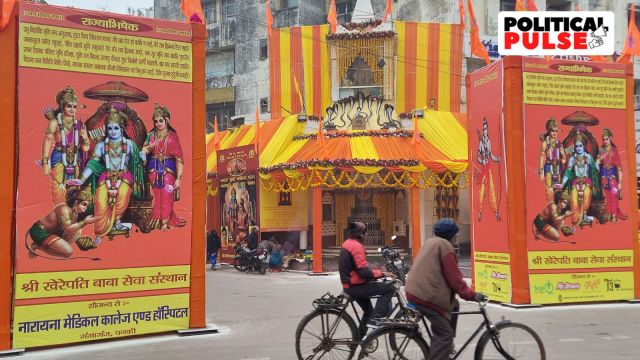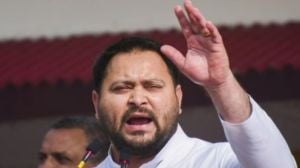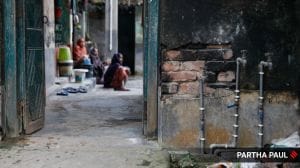So near yet so far, Kanpur delights in Ram Temple’s glory
Decaying leather industry, rising prices, stalled incomes worry the city, but right now, it's only January 22 “Diwali” that is on their minds.
 A temple decked up in Kanpur. (Express photo)
A temple decked up in Kanpur. (Express photo)Sachin Gupta, 25, and Rohit Dubey, 27, have braved the icy winds blowing across from the Ganga to climb up to the Siddhanath Temple in Kanpur’s Jajmau area. But on the minds of both is another shrine, the Ram Temple coming up in Ayodhya, and how their colonies and nearby markets are gearing up for the temple inauguration.
Gupta, who works with Airtel, wishes the government would declare January 22 a gazetted holiday so that people can celebrate “two Diwalis every year”. Dubey, a businessman, has relatives coming from other cities to celebrate the inauguration day.
“Modi-Yogi have made the dreams of Hindus come true,” they say.
Just a kilometre away, in the heart of the Jajmau leather industry, Muzammil, 28, a small-time leather tanner, has a forlorn look on his face.
No, it is not the Ram Temple. “Our profits are going down every day. Every time there is a festival associated with the Ganga or any big event, the tanneries are shut down first, for the fear of polluting the river. We are again going to be shut for five days. It is the government’s job to have the effluent treatment plants working. Why should we suffer? They don’t let us do dry work either,” he says.
As far as Ram Temple is concerned, “What problem could I possibly have? But instead of doing Hindu-Muslim all the time, why don’t they worry about the leather industry? Our business is going to Bangladesh,” Muzammil says.
As the crow flies, Kanpur is around 200 km from Ayodhya, and less than half that distance from state capital Lucknow. But the city that is among Uttar Pradesh’s largest figures on nobody’s map, defined by its declining leather industry and circumscribed by it – including unwelcome spotlight under the BJP regime’s tightened cattle slaughter laws.
However, the BJP is on the rise in the Kanpur-Auraiya belt too, replacing the Samajwadi Party and BSP with support among upper castes, non-Yadav OBCs and non-Jatav Dalits.
 Sri Ram flags adorning the courtyard outside Tunday Kababi. (Express photo)
Sri Ram flags adorning the courtyard outside Tunday Kababi. (Express photo)
Shiva, 19, and Akash, 25, both leather factory workers and Valmiki Dalits, can’t hide their excitement about the Ram Temple, or Prime Minister Narendra Modi.
“Modi has got himself in the pages of history by getting this temple made. Nobody could have done it. Generations will remember him,” says Shiva.
Akash says their shantytown on the banks of the Ganga will be decked up for the consecration day. They also discuss plans to visit the temple in the next six months.
Pressed on problems the government can address, they admit inflation: “Prices keep rising, but our incomes don’t. That’s the only problem.”
On the highway abutting Jajmau, Sonu Prajapati, 32, a potter, has cleared out his Diwali diya stocks as people buy them for January 22. “It is because of Modi-Yogi that the temple is being built,” says a pleased Prajapati. “So many governments came, but they have the courage. Muslim ki dabangai khatam ho gayi. Ab bhaiya-bhaiya kar ke baat karte hain (Muslim intimidation is over. Now they are so polite to us),” he says.
In the Mihauli village of Auraiya, Koeris, an OBC community, are also gearing up to celebrate January 22 with diyas and crackers. Mukesh Kumar, 26, a farmer, says, “Had it been summer, a lot of us would have also gone to Ayodhya.”
He and his neighbours, all Koeris, are aware the celebration is political, but do not have a problem with that. “Without Modi-Yogi, this temple would not have been built,” Kumar says.
However, fellow Koeris Geeta Devi and Daulat Ram, who are middle-aged, are uncomfortable with some of the anti-Muslim rhetoric around the temple. “Build the temple, but don’t do divisive politics,” says Daulat Ram, who also feels the consecration should have also been put off till the temple was completed. “Modi is a good leader, a saint, but the temple should have been inaugurated after completion. This is being done for the coming elections.”
Geeta Devi talks about inflation and how getting a cylinder refill has become difficult.
Lalu Valmik, 45, also complains about getting the benefits of neither the PM Awas Yojana nor free rations. He adds: “Ab sab Diwali manayenge, toh hum bhi manayenge (Now when everyone celebrates Diwali on January 22, we will too). But we won’t vote for Modi this time.”
Daulat Ram has a confusion, about this talk regarding Sanatan Dharma. “Is it Ram, Krishna, Shiva or Kali? Is it only Ram?”
But at Bara village near Akbarpur in Kanpur Dehat district, Srikant Gupta, 24, who runs a tuition centre, has it figured. Proud for the temple, Gupta says: “Earlier, there was only Sanatan Dharma, Then, Muslims came and broke our temples. Sanatan Dharma will be reestablished now.”
However, that doesn’t mean a Hindu Rashtra, he says. “Phir toh hum bhi sultanate ho jayenge. Aur sultanate atyachar karti hai (That would make us a monarchy. And a monarchy runs on repression).”
Anshu Gautam, 25, a Valmiki farmer in the village, sees the temple as justice for Hindus. “One should get what’s rightfully theirs. Muslims should not complain as the matter has been settled by court,” he says.
While he credits Modi for the temple, he praises Yogi (Chief Minister Yogi Adityanath) for ending “gundagardi (rowdyism)”. “Pehle thane mein sunwayi nahin thi. Ab ijjat se bithate hain. Pehle kuchch bol do to bade log chup kara dete thai (Earlier, no one would give us the time of the day at police stations. Now they listen to us respectfully. Earlier, if we said anything, the upper castes would shut us down),” he says.
His mother, however, wishes the BSP was still powerful. The stray cattle menace on her mind, she says: “We were all BSP voters, but now the BSP has no strength left.”
Hasan Khan, 30, a fellow villager who runs a tour service, says he has no problem with the temple. “Mandir, masjid bante rehne chahiye (Temples, mosques, these places should keep getting built).”
He doesn’t think much about religion, Khan adds. “All my drivers are Hindus. They keep Shri Ram idols and photos in cars. I never ask them to remove them. It is their faith. I celebrate Holi and Diwali. There are just a handful of people in both communities who keep doing Hindu-Muslim and that spoils the atmosphere,” Khan says.
Saheb-e-Alam, 26, a barber, however, admits he worries about the suspicion that runs now between the two communities. “When I was a child, we would eat in Hindu homes, and vice-a-versa. It does not happen anymore. Religious processions are taken out by certain Hindu groups, and they taunt us in a bid to provoke. It didn’t happen earlier,” he says.



- 01
- 02
- 03
- 04
- 05




























